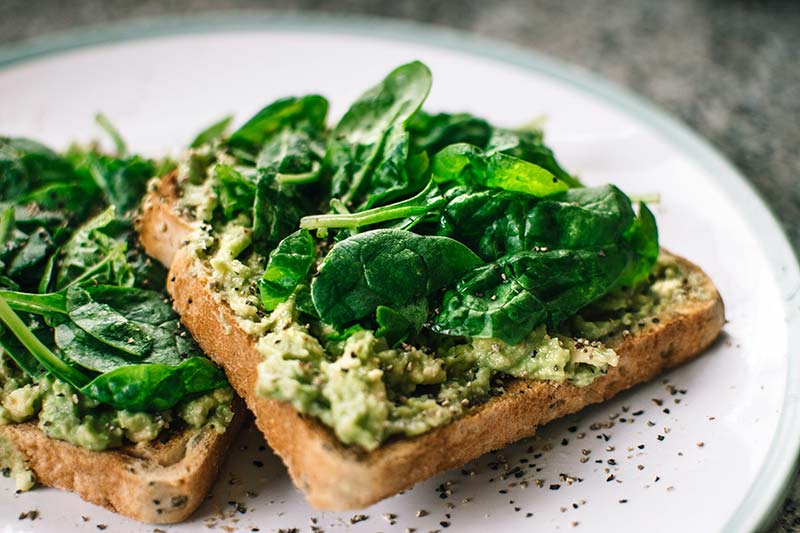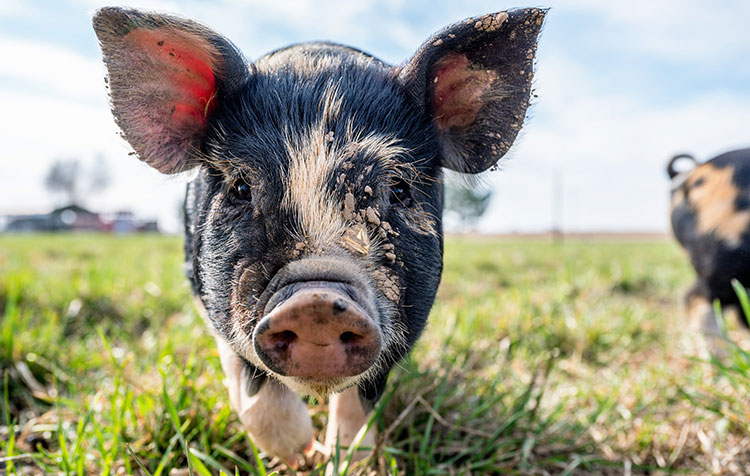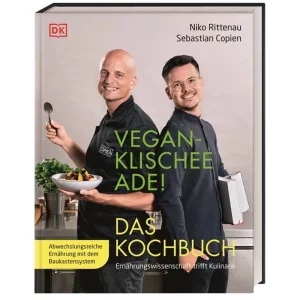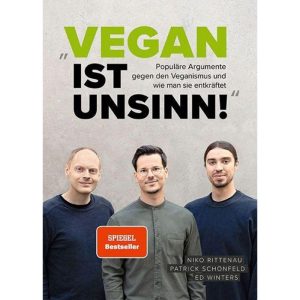Is veganism a luxury problem? As you may know, there are many Prejudices against vegans. Again and again I even hear that I am spoiled or even stubborn when I follow the (supposedly expensive) vegan lifestyle.
But is that true? Is it really a luxury to eat a purely plant-based diet? It's time to take a closer look at this argument.
In this article, I would like to briefly and concisely explain why it is often claimed that veganism is in some way luxurious and why serious veganism is actually the absolute opposite of a luxury problem. Let's go!
What does luxury actually mean - and how is veganism defined?
In the dictionary the term luxury is translated as "costly, wasteful, beyond the normal scope, not necessary, pursued only for pleasure." and "splendor, lavish abundance".1
In short: Luxury problems are behaviors or objects that go beyond the usual, serve only personal pleasure and can be considered unnecessary or even wasteful.
The Veganism defined the dictionary, however, as "[ethically motivated] complete renunciation of animal products".
Veganism as a luxury problem? Why this is claimed

Many people feel attacked by vegansbecause they fear a change in their lives. The reflexive statement that veganism is a luxury problem can, in my opinion, generally be traced back to the following things:
- Price Intensity: Certain Vegan food is sometimes a little more expensive (e.g. processed meat substitutes) than their conventional counterparts. This is why many people consider a vegan diet to be expensive and luxurious.
- Decadence: That vegans live in luxury is an assertion that often arises from eating vegan in a world in which others live in luxury. People starve. In combination with the supposedly high costs, some people see veganism as luxurious or elitist.
- Know-it-all: Those who live vegan have their reasons. And some vegans never tire of stating them. They are then quickly seen as "know-it-alls" - and, as we all know, nobody likes them. A quick and easy counter-reaction is therefore often the prejudice that veganism is a luxury problem.
- There are bigger worries in the world: Vegans want Protect animals in everyday life. For some people, veganism is a luxury problem because there are people elsewhere who have much worse (real) problems to deal with. Non-vegans then like to say something like "you're just doing far too well".
Whatever motives give rise to this belief: In my opinion, the luxury argument is a sign that people so far only marginally with the Reasons for the vegan lifestyle busy have. I will explain why below.
Why the vegan lifestyle is not a luxury problem
It is simply no longer necessary to eat meat. On the contrary: the world would be a better place if we would eat less or no more meatbecause the ecological and social consequences of increasing meat consumption are threatening. Veganism is therefore absolutely is not a problem, but a solution.
A real problem, however, is the generally luxurious lifestyle of our society. On average, we consume almost 52 kilograms of meat per capita per year2We drive fat cars that weigh tons, buy a new smartphone almost every year and occasionally buy a T-shirt for 5 euros.
We live in a world of abundance and don't want to see others pay the price. In this world, the decision to go vegan is not a selfish luxury, but a big and selfless step towards a sustainable consumer behavior.
But luxury is, in a Throwaway Society where you can have everything you want at any time. Sunday roasts used to be a luxury - today meat is on the plate every day. So much so that many a Footballer gilds his steak leaves. A life of abundance is a luxury.
Veganism is the opposite, because it combines ecological, social and ethical values with each other. And in such a way that our children and grandchildren will still be able to spend a time worth living on this planet.
At this point I would like to refer to the Impact of a vegan everyday life and emphasize once again why it is not at all glamorous or luxurious.
Cost effective to implement
Even if they make it easier for many people to start a vegan diet, they are some Vegan substitute products slightly more expensivethat's right. And, admittedly, this also quickly gives the impression that veganism is a real luxury.
But other finished products are expensive or Lobster and steaks from Argentina too. And vegan staple foods such as rice, lentils or pasta as well as fruit and vegetables are usually even the cheapest food in the supermarket.
The price of veganism is therefore not a luxury problem. On the contrary: if you often cook fresh vegan food, you can save money with sustainability.
Cookbook recommendation: For a good introduction to plant-based cooking, I can warmly recommend the book "Vegan & Easy" by Bianca Zapatka with lots of delicious recipes. The Cookbook is available here*.
An end to animal suffering for luxury
Animals are emotional beings. Innocent beings who have done nothing wrong and do not want to die. In Germany alone, around 750 million chickens, pigs, cows and other so-called "farm animals" are killed every year - in other words, more than two million animals a day.3
Isn't it actually more of a luxury to pay someone else money to kill an animal so that you can eat it yourself? In that way, how humiliatingly we have treated our animalsfuture generations are guaranteed to look at them with disgust.
The Ethical decision to follow a vegan dietto reduce the suffering of other living beings is therefore extremely selfless, not focused on your own pleasure and certainly not luxurious.
World hunger is ended
I recently heard that we need to solve other problems, such as world hunger, before we turn our attention to animal welfare. And that veganism is therefore only a real luxury problem. Yet the decision to be veganThe world's hunger.
To get one animal calorie of vegetable calories are consumed in the form of animal feed. If we humans didn't keep so many farm animals for meat, everyone in the world would have enough to eat.
The high Meat consumption is therefore the real luxury. Because other people have to starve so that we can regularly indulge in meat. The luxury feeling of the "Sunday roast" has long since been lost. Just like the awareness that a sentient being had to die for that piece of meat.
Also, the decision to eat a vegan diet in order to reduce the Stop world hungeris anything but luxurious. On the contrary: it is compassionate, respectful and selfless.
Species extinction is halted
Around 83 percent of the world's agricultural land are cultivated for pasture or as fodder for livestock.4
Most of the feed available is soybean meal, which contains protein and comes mainly from South American countries such as Brazil. The cultivation of Soy as animal feed for meat production and the creation of pastureland are the main reasons for the Deforestation of the rainforests in the Amazon region.
Apart from the moral issue, the Factory Farming also for a massive Pollutant input into the soil and water. The keeping of ruminants such as cows also creates a Massive greenhouse gas emissionswho is the global warming and jeopardizes the prosperity of all people.
As a vegan in the everyday life also protects the environmentone has one more reasonnot to label veganism as a luxury problem.
Good to know: The fact that veganism is a luxury problem is therefore a particularly cynical and provocative argument, because the opposite is actually the case. Eating a lot of meat is decadent and elitist. And it is also decadent that we kill millions of animals for nothing because we throw the food made from them in the garbage can.
Internalize that veganism is the answer to luxury problems

We actually enjoy luxury in today's world, to be able to feed ourselves and dress ourselves warmly without having to torture animals to do so. But of course veganism is not a "lifestyle of spoiled kids" or a luxury problem. However, it is very much a luxury problem that we live in a society in which natural resources are wasted in abundance.
Living vegan means consuming consciously and respecting other living beings and things. And to treat them as you would like to be treated yourself. Doing without something in order not to harm others is really the absolute opposite of luxury.
So try out your first recipes from the plant-based kitchen now. The book was extremely helpful "Vegan & Easy" by Bianca Zapatka. If you like, get the cookbook now here*.
"The greatness of a nation and its moral progress can be judged by the way its animals are treated."
Mahatma Gandhi, Indian lawyer and pacifist (1869-1948)
Do you have any questions, tips or just want to say a few words about the supposed "first world luxury problem" of veganism? Then feel free to write me a comment.
Stay animal-friendly and sustainable,

PS: Make sure you have a look at the Vegan Blog around. Find out there, for example, Why vegans don't drink milk from cows.
References:
- Bibliographisches Institut GmbH, Dudenverlag: Luxus, available at https://www.duden.de/rechtschreibung/Luxus. [15.11.2024]. ↩︎
- Statista GmbH: Meat consumption in Germany per capita in the years 2010 to 2023 (March 2024), available at https://t1p.de/oorx. [15.11.2024]. ↩︎
- WWF Germany: (Mass) animal husbandry: consequences for animals, humans and the climate (as of 09.10.2023), available at https://www.wwf.de/themen-projekte/landwirtschaft/massentierhaltung. [15.11.2024]. ↩︎
- Poore, J./Nemecek, T. (2018): "Reducing food's environmental impacts through producers and consumers". In: Science Vol. 360, Issue 6392, pp. 987-992. ↩︎








